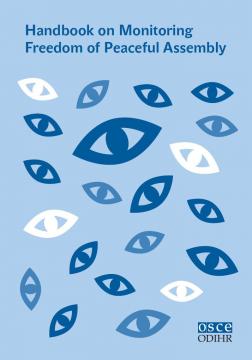Handbook on Monitoring Freedom of Peaceful Assembly

The OSCE Office for Democratic Institutions and Human Rights (ODIHR), often in co-operation with the Council of Europe, has been active in providing legislative and other assistance to OSCE participating States to ensure that public assemblies are regulated and policed in line with international human rights standards. As part of this work, ODIHR and the Council of Europe’s Commission for Democracy through Law (the Venice Commission) have developed the Guidelines on Freedom of Peaceful Assembly, first published in 2007 and revised in 2010. This Handbook draws from the Guidelines and is intended as a tool to support civil society actors in their effort to contribute to strengthened implementation of human rights through monitoring and reporting on freedom of assembly.
The Handbook builds on the experience acquired through a series of projects implemented by ODIHR and its partners, and aimed at training human rights NGOs in international standards and monitoring techniques relating to freedom of assembly. In particular, it is based on a training programme for assembly monitors that has been offered in a number of OSCE participating States, where observers carried out the systematic monitoring of public events over a period of several months.
Assemblies take place in public places and, as such, allow for the direct observation of the conduct of and interaction between the participants, law-enforcement agents, other public authorities and other relevant actors. The Handbook places an emphasis on the need to base assembly-monitoring reports on first-hand information collected in adherence with the principles of transparency, accuracy and impartiality.
The views, opinions, conclusions and other information expressed in this document are not given nor necessarily endorsed by the Organization for Security and Co-operation in Europe (OSCE) unless the OSCE is explicitly defined as the Author of this document.
